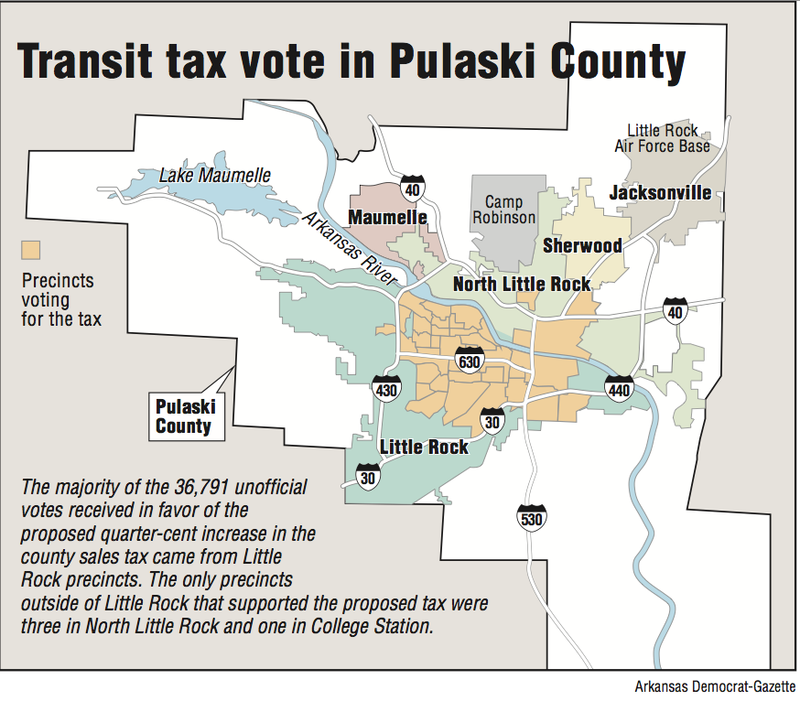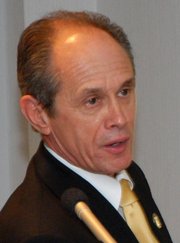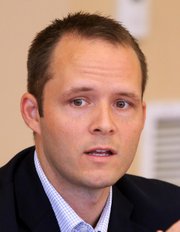Voters' rejection of a quarter-percentage-point increase in the Pulaski County sales tax that would be dedicated to transit won't stop Rock Region Metro from working to improve service and increase ridership, the agency's top official said.
Transit supporters also said Tuesday's tax-proposal defeat won't dissuade them from mounting another attempt to get the tax increase adopted, though when they'll do that is uncertain.
The sales-tax proposal received 43 percent of the 85,632 votes cast, according to unofficial vote totals.
Against 48,841
For 36,791
The area's first tax to be solely dedicated to transit was projected to raise $18 million annually. Rock Region Metro planned to use the proceeds to expand regular bus service, increase the frequency of stops on its busiest routes, tailor other routes to better serve riders and establish some routes using larger buses on traffic lanes reserved for them.
The proposed tax drew little support from outside Little Rock. Within the city, support was strongest downtown and in the Heights and Hillcrest neighborhoods. Outside the city, only three precincts in North Little Rock and one in College Station favored the measure.
No precincts in Maumelle, Jacksonville or Sherwood, which all would have seen community bus service established for the first time, voted for the proposed tax.
"We need to do more connecting and campaigning in the unincorporated areas" of the county, and in places like Sherwood and Maumelle, said Donna Massey, a Pulaski County justice of the peace who served as a co-chairman of the campaign supporting the proposed tax. "I don't think everybody realized how it would benefit them."
Jarod Varner, the executive director of Rock Region Metro, said last week that his agency will continue to evaluate ways to make transit service more efficient and to attract more riders, within the confines of its 30-year-old funding agreement with the county and the county's major cities. Those cities and the county provide the majority of the agency's roughly $16 million funding.
Eventual recommendations will likely involve shifting bus service from one area to another, he said. Whatever recommendations the staff develops, they will be vetted by the transit board and the public before they are put in place, Varner said. Changes could happen as soon as August, he said.
He and transit-tax supporters say they were encouraged by the vote results even though the tax didn't pass.
"Forty-three percent of Pulaski County voters supported the tax," Varner said. "That's a good base of support."
He also pointed to support the tax received from the Metroplan board. Metroplan is the long-range transportation planning agency for central Arkansas. Its board consists of the region's county judges and mayors.
Other groups that voiced support of the tax included the Downtown Little Rock Partnership, the North Little Rock Chamber of Commerce, the Maumelle Chamber of Commerce and the Central Arkansas Library System board of trustees.
The proposed tax "received unprecedented support from elected leaders, business leaders and neighborhood associations," Varner said. "We're encouraged."
Massey called the results "impressive," especially given how little money the Committee to Connect campaign raised -- about $22,000 in the most recent reporting period -- and how little time supporters had to campaign for it -- about six weeks.
The Arkansas chapter of Americans for Prosperity said its volunteers knocked on 5,000 doors and made 39,000 phone calls to "alert" voters about the tax.
Its state director, David Ray, said last week that the election results delivered "an overwhelming message" that voters in the county feel "they are taxed enough already."
Jacksonville Mayor Gary Fletcher, who is president of the Metroplan board, said that may have been the case with voters in his city. The previous month, Jacksonville residents voted to approve a millage increase to finance improvements to the city's new school district, which was split off last year from the Pulaski County Special School District.
"The problem in Jacksonville was that we had just been hit with a millage [increase]," Fletcher said. "The timing wasn't good."
Still, Fletcher called the vote encouraging. "Sometimes it's hard to see the positives when you can't see past the negatives."
He also said the campaign for the tax may have gotten "lost in the presidential primaries." In the days leading up to the election, several GOP and Democratic candidates for president, including businessman Donald Trump, U.S. Sens. Ted Cruz of Texas and Marco Rubio of Florida, all Republicans; and former Secretary of State Hillary Clinton, a Democrat, made high-profile appearances in Arkansas.
No one is ready to say when transit supporters will try again to get more money for bus service.
"We need to meet first and have a discussion," Massey said. "We have a long battle ahead of us."
"We do need to sit back and assess what we could have done differently," Fletcher said.
Even before the vote, Rock Region Metro had embarked on a series of changes. Those included the adoption of a new name for the agency that previously was Central Arkansas Transit; a new paint scheme for its fleet; the acquisition of 15 buses powered by natural gas; the availability of free Wi-Fi aboard its buses; and the introduction of a smartphone app that locates buses in real time.
But additional changes without the tax money won't be easy. The annual contributions to the agency from the county and its participating cities total about $12.5 million. Other funds, including federal aid and ticket revenue, boosted the agency's annual operating budget to about $16 million for this year.
The contributions are determined on the basis of routes in Little Rock, North Little Rock and other parts of the county. That funding system limits Rock Region Metro's ability to change the routes because if route mileage decreases in one city, that city would pay less and the other partners would automatically have to pay more.
But it can be done, Varner said. "It's the same planning process the agency has been going through for many years."
Metro on 03/06/2016



